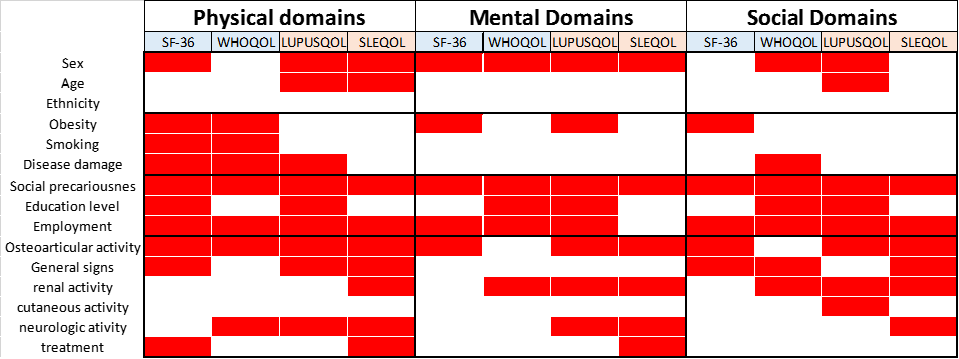Session Information
Date: Wednesday, November 16, 2016
Title: Systemic Lupus Erythematosus – Clinical Aspects and Treatment VI: Quality of Life
Session Type: ACR Concurrent Abstract Session
Session Time: 11:00AM-12:30PM
Background/Purpose:
To describe demographic, socio-economic and lupus-related factors associated with health-related quality of life (HRQOL) in systemic lupus erythematosus (SLE), as measured by 2 generic (Medical Outcome Study Short Form 36 [SF-36] and World Health Organisation Quality of life [WHOQOL] and 2 disease-specific (LupusQoL and SLEQOL) questionnaires recorded simultaneously.
Methods:
We conducted a prospective study involving SLE patients in 10 French tertiary hospitals. Disease activity was recorded by SELENA-SLEDAI (SS) and SS Flare Index Revised [SFI-R] alongside HRQoL and sociodemographic variables. Social precariousness was recorded using the validated “EPICES” questionnaire. Factors influencing HRQOL scores were studied using multivariate linear regression. All scores were transformed to a 0-100 scale (100 corresponding to the best QoL)
Results:
We included 336 patients, of whom 90% were women, mean age (SD) was 41(11.9), 51% were caucasian. Median (IQR) SLEDAI was 4 (0-8), and 39% of patients had at least a moderate flare. Social precariousness was recorded in 38% of patients, 62% had an education level greater than General Education Diploma and 31% were unemployed.
In multivariate analysis (figure 1), we found no effect of ethnicity on HRQOL. Social precariousness was strongly associated with the QoL score in all domains of generic and specific questionnaires, with mean estimated decreases ranging from -6.5 (SF-36 “Physical Functioning, p=0.02) to -17.84 (SLEQOL “Mood”, p<0.0001). The occurrence of an articular flare was also associated with a decrease in HRQOL in all domains (e.g. -19.6 in SF-36 “Role Physical” [p<0.0001] and -10 in SLEQOL “mood”, [p=0.01]), except for “psychological” and “environment” domains of the WHOQOL. Neuropsychiatric signs had a higher impact on specific questionnaires (figure 1). Obesity was associated with a significant decrease in HRQOL in SF-36 physical-related domains (-12.9, p=0.02 in “physical function” domain), but not in disease-specific questionnaires, except for the LupusQoL “Body Image” Domain (-8.57, p=0.02). Similarly, smoking was associated with a poorer HRQOL in some of the physical domains of generic questionnaires (-5.57 in WHOQOL “physical heath”, p=0.03), but not with disease-specific ones.
Conclusion: The social environment is highly associated with HRQOL in SLE patients, regardless of the instrument or domain. Disease-specific questionnaires may be more strongly correlated with some aspects of the disease and may be useful to distinguish the SLE-specific burden from other conditions such as obesity or smoking-related disease.
Figure 1: Summary of multivariate analysis. A red square indicates a significant independent association in multivariate linear regression (p<0.05) between a variable and at least one QoL domain score
To cite this abstract in AMA style:
Devilliers H, Besancenot JF, Audia S, Bonnotte B, Maurier F, Broussolle C, Magy-Bertrand N, Wahl D, Pennaforte JL, Martin T, Aumaître O, Blaison G, Muller G, Mathian A, Binquet C, Amoura Z. Socio-Demographic and Clinical Factors Influencing Generic and Disease-Specific Quality of Life in Patients with Systemic Lupus Erythematosus: Results of a Prospective Multicenter Study [abstract]. Arthritis Rheumatol. 2016; 68 (suppl 10). https://acrabstracts.org/abstract/socio-demographic-and-clinical-factors-influencing-generic-and-disease-specific-quality-of-life-in-patients-with-systemic-lupus-erythematosus-results-of-a-prospective-multicenter-study/. Accessed .« Back to 2016 ACR/ARHP Annual Meeting
ACR Meeting Abstracts - https://acrabstracts.org/abstract/socio-demographic-and-clinical-factors-influencing-generic-and-disease-specific-quality-of-life-in-patients-with-systemic-lupus-erythematosus-results-of-a-prospective-multicenter-study/

